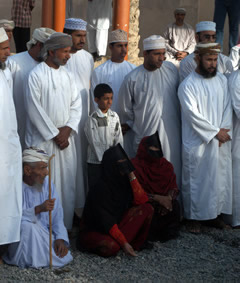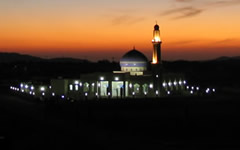Ibadi
Islam is a form of Islam distinct from Shia or Sunni Islam and is one
of the oldest schools. Oman is the only country in the world, where the
Ibadis form the majority of the population. Ibadi communities are generally
regarded as conservative. They believe that the attitude of a true believer
to others is expressed in three religious obligations:
walayah: friendship and unity with the practicing true
believers, and with the Ibadi Imams.
barah: dissociation and hostility towards unbelievers
and sinners, and those destined for hell.
wuquf: reservation towards those whose status is unclear.
Ibadis regard other Muslims as kuffar an-nima, "those who deny God's
grace" and they deny walayah to those other Muslims.
Ibadis also have several doctrinal differences with orthodox Sunni Islam,
chief among them:
Muslims
will not see Allah on the Day of Judgement. This is contrary to the mainstream
Sunni belief that indeed Muslims will see Allah with their eyes on the
day of Judgement.
Whosoever enters the hellfire, will live therein forever. This is contrary
to the Sunni belief that those Muslims who enter the hellfire will live
therein for a fixed amount of time, to purify them of their shortcomings,
after which they will enter Paradise.
Ibadis have also a different belief about the legitimate succession of
Muhammad than other Islamic schools. They keep extremely close to the
Holy Scripture, but are today a very pluralistic and tolerant group.
To read more about the religion in Oman, please download the essays "Introduction to Oman" by Felix Richter and "Islam and the particularities of the Ibadi denomination" by Anne Hoffmann and Priska Dittrich.
Continue to "Politics in Oman".

